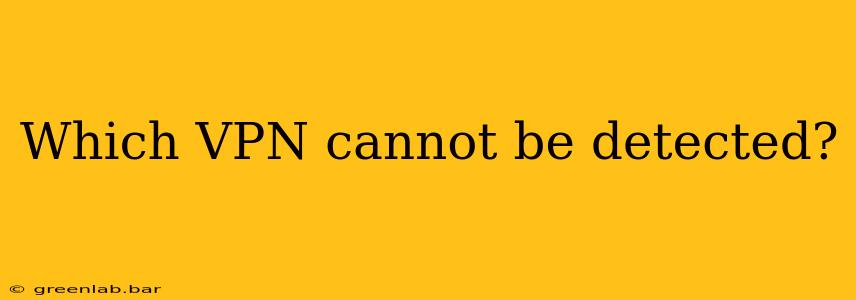Which VPN Cannot Be Detected? The Truth About VPN Invisibility
The question "Which VPN cannot be detected?" is a common one, but the answer is more nuanced than a simple product recommendation. No VPN is truly undetectable under all circumstances. While many VPNs offer strong encryption and obfuscation techniques to mask your online activity, determined entities with sufficient resources can still identify and potentially trace your connection back to you. Let's explore the factors influencing VPN detection and what you should realistically expect.
Factors Affecting VPN Detection
Several factors contribute to a VPN's detectability:
-
VPN Provider's Infrastructure: A reputable VPN provider invests heavily in its infrastructure. This includes a large network of servers across diverse locations, robust security protocols (like OpenVPN or WireGuard), and constant updates to counter detection methods. Providers who skimp on these aspects are more easily detected.
-
Encryption Strength: Strong encryption is the cornerstone of VPN security. Advanced encryption algorithms make it significantly harder to decipher your online traffic. Look for VPNs utilizing AES-256 encryption, considered virtually uncrackable with current technology.
-
Obfuscation Techniques: This refers to methods that disguise your VPN traffic to make it appear as regular internet traffic. This is crucial for bypassing firewalls and deep packet inspection (DPI) technologies often used by governments, schools, or workplaces to block VPNs.
-
Logging Policy: A strict no-logs policy is paramount. A VPN provider that logs your activity essentially defeats the purpose of using a VPN in the first place, as your data could be handed over to authorities or misused.
-
The Entity Attempting Detection: The sophistication of the entity trying to detect your VPN use significantly impacts the outcome. A basic website might not notice you're using a VPN, while a government agency or a large corporation with specialized monitoring tools could potentially detect even the most advanced VPNs.
The Illusion of "Undetectable" VPNs
Marketing often creates the misleading impression that certain VPNs are undetectable. While some VPNs are better at masking your activity than others, no VPN guarantees complete invisibility. The best VPNs minimize your digital footprint, making detection significantly more difficult, but they don't eliminate the risk entirely.
What to Look for in a Reliable VPN
Instead of searching for an "undetectable" VPN (which doesn't exist), focus on these key features:
- Strong Encryption: AES-256-bit encryption is the gold standard.
- Robust Protocols: OpenVPN and WireGuard are generally considered secure and reliable.
- Obfuscation Techniques: Look for features that mask VPN traffic, such as stealth mode or scrambled connections.
- No-Logs Policy: Verify that the provider has a clear and verifiable no-logs policy.
- Kill Switch: This feature cuts off your internet connection if the VPN connection drops, preventing accidental data leaks.
- Independent Audits: A VPN provider that undergoes regular independent security audits demonstrates its commitment to transparency and security.
Conclusion
The pursuit of an "undetectable" VPN is ultimately a futile one. Focus instead on choosing a reputable VPN provider with a proven track record of security, strong encryption, robust protocols, and a transparent no-logs policy. This will significantly reduce your risk of detection, offering you a much higher level of privacy and security online. Remember, even the best VPNs can't offer absolute anonymity; responsible online behavior remains crucial.

